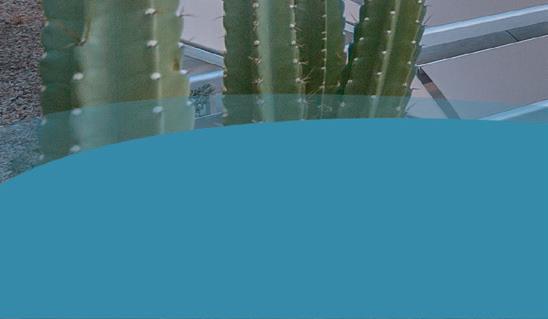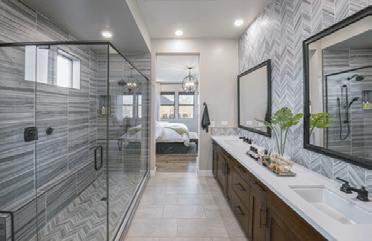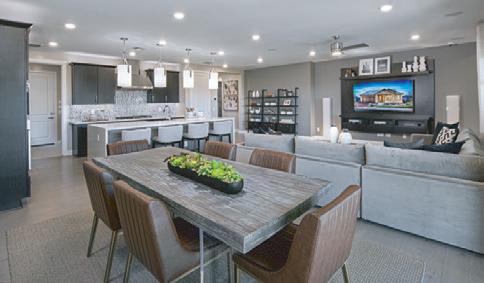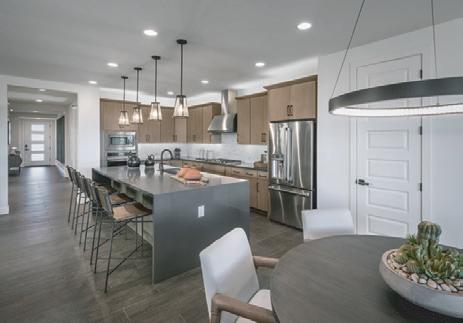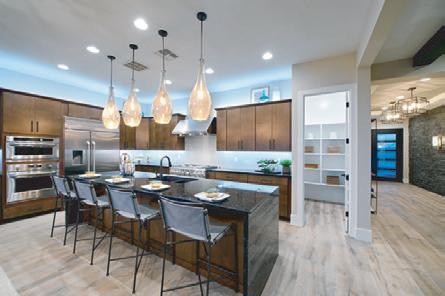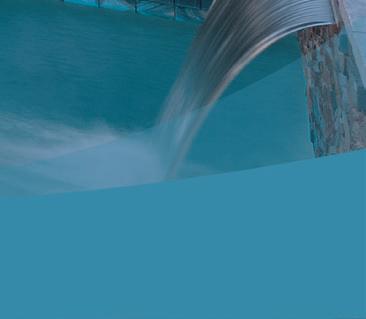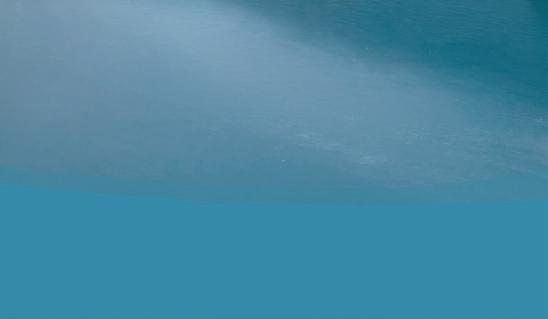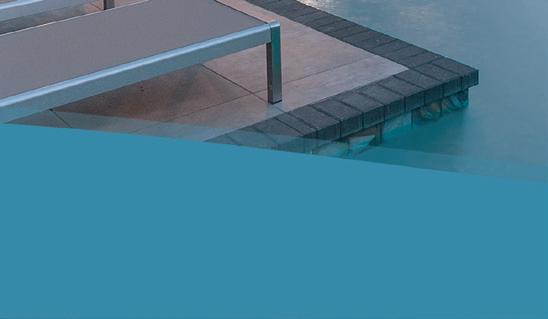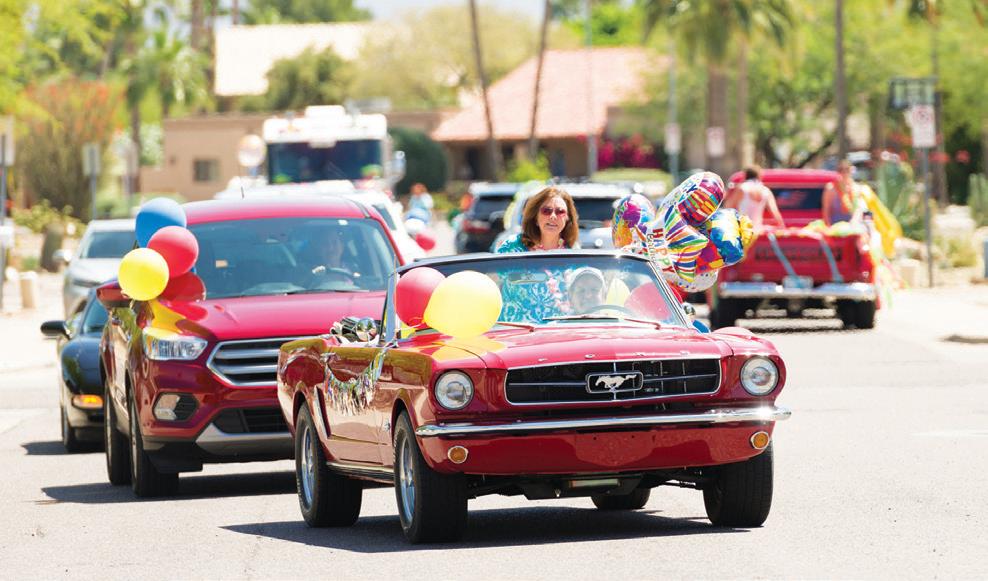
13 minute read
BUSINESS
Scottsdale.org l
@ScottsdaleProgress /ScottsdaleProgress
She makes home life easier for the disabled
BY PAUL MARYNIAK Progress Executive Editor
Staying in place has a special meaning for Dr. Emily Reilly.
The Scottsdale woman and her business, Purposefully Home, is all about making that place comfortable and efficient for people whose disabilities might not necessarily have them looking at their home as a place where their heart is.
Her business is all about improving the functionality of their home, ultimately making it more comfortable.
The modifications could range from a lower bathroom sink for a wheelchairbound person to a total kitchen makeover to make cabinets, appliances and stationary equipment easy to reach.
Reilly explains her mission simply: “I help transform a person’s home from a just-for-now home to a forever home.”
It could involve a parent looking to
Dr. Emily Reilly helps makes homes more navigable for disabled people.
(Pablo Robles/Progress Staff Photographer)
childproof their home, a multigenerational family living under one roof trying to accommodate everyone, someone recovering from an injury, a child with special needs or seniors looking to live in their home and avoid being placed in a facility for the elderly.
In the current COVID-19 pandemic, the need for her business likely become more noticeable for some.
With stay-at-home orders in place, she said, “families have had to completely transition their homes into work spaces, school rooms, entertainment and home gyms. If some of the environment was designed for ease of use, there may be a lot less turmoil within" them.
On the other hand, she added, “working directly with families in their homes requires travel from place to place and a lot of interaction within the community." Combined with other factors, she explained, "it can be challenging to effectively meet the needs of clients to coordinate care.”
“Home projects can be low-tech or very involved in larger scale remodels but many people are uncertain when a loved one may return home or the future of their own employment," Reilly added. "Therefore, financial stress and general concern for exposing loved ones" have become roadblocks to business.
Reilly is not an interior designer per se.
With a master’s degree in occupational therapy from The Sage Colleges in Troy, New York, she earned a doctorate in health science from Nova Southeastern University and an advanced certificate in home modifications through University of Southern California.
As an occupational therapist with experience in long-term care, Reilly thinks of a home “beyond the typical ‘fridge, stove, counter, done' model.”
She started her company in 2017 largely after caring for her mother and
seeHOME page 22
Scottsdale businesses helping nonprofits
BY KRISTINE CANNON
Progress Staff Writer
Throughout April, restaurants, schools and businesses small and large have been giving back to hospitals and healthcare workers, nonprofits, essential workers and other hometown heroes with face masks, sanitation wipes or free meals.
Mission2Alpha, a local nonprofit for injured veterans and first responders, partnered with Rooster Tavern to donate $500 worth of meals to both the Scottsdale Police Department District 3 Vía Linda and to the Scottsdale Fire Department Station 610.
Evening Entertainment Group has so far donated more than 500 meals from Casa Amigos to HonorHealth Scottsdale Shea
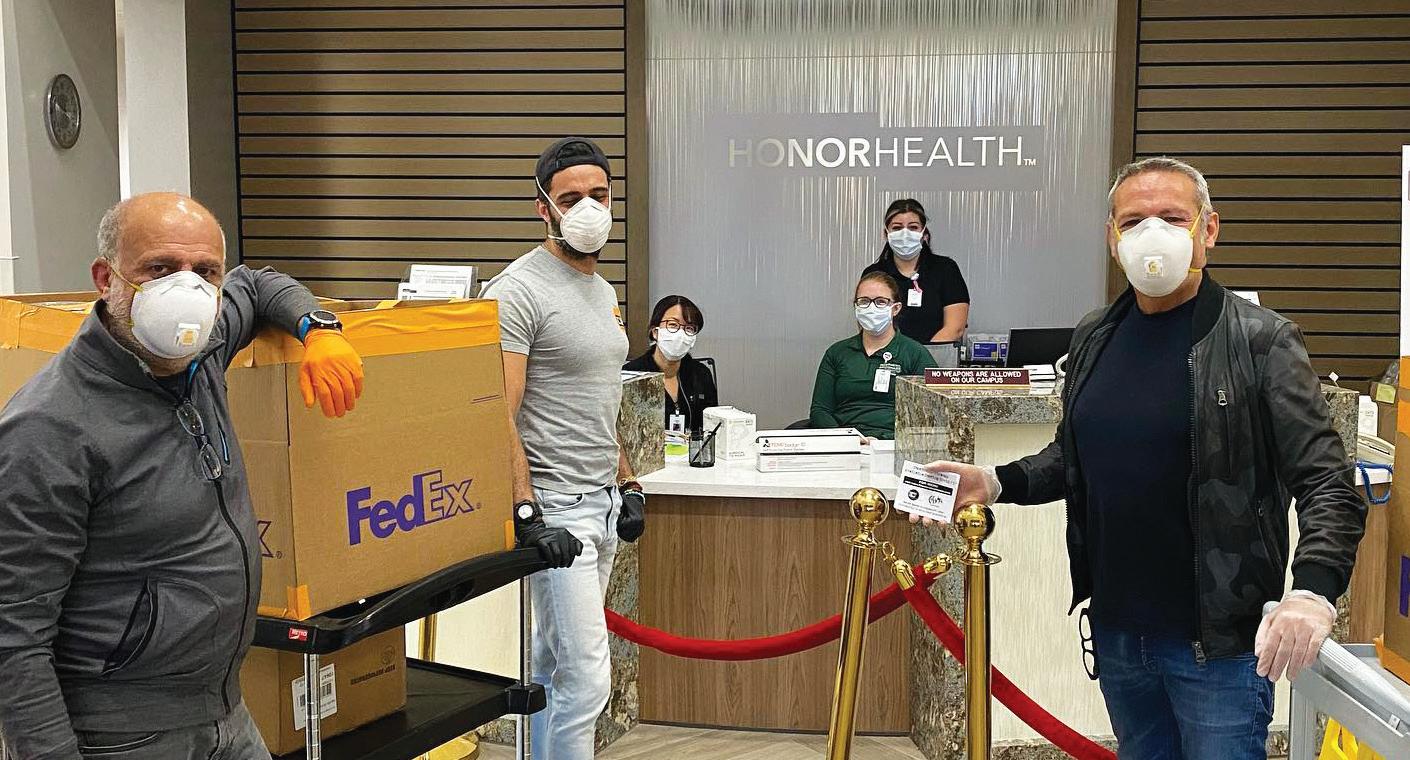
Medical Center, HonorHealth Scottsdale Osborn Medical Center, Mayo Clinic and Phoenix Children’s Hospital.
They will drop off an additional 300 meals paid for by their loyal customers within the next couple of weeks.
HonorHealth Scottsdale Shea Medical Center also received 150 meals from Casa Mia and CM2 Pizzeria & Bake Shop.
Brat Haus’ Scottsdale location provided free meals to more than 1,500 essential workers at HonorHealth Scottsdale Osborn Medical Center as part of its “Feed the Heroes” program.
“These incredible people are risking their lives daily in order to help others,” said Dave Andrea, Brat Haus owner. “It’s
been really gratifying to make even the smallest difference for them. Now is the time to make sure that they are being taken care of too.”
Brat Haus also started a “Drain the Taps” program that offers 64-ounce growler fills for $10.
Restaurant vendors such as Denmark Foods, Capistrano Bakery, Waterloo Sparkling Water and Crescent Crown Distributing have donated products and funds to the program.
“As long as the community continues to visit our curbside pick-up and take advantage of the great beer special, we’ll keep feeding the first responders and health care workers that we’re counting on to get us through this pandemic,” Andrea said.
Scottsdale-based businesses are also donated personal protective equipment, or personal protective equipment.
PCA Skin partnered with FABRIC and their nonprofit, AZ Apparel Foundation, to produce FDA-approved PPE.
Through April 30, PCA Skin will donate 100 percent of proceeds from their daily care mask online sales to AZ Apparel Foundation.
Proceeds up to $10,000 will assist FABRIC in ramping up production of PPE.
“We are amazed by the work our Arizona neighbor company, AZ Apparel Foundation, is doing to help alleviate the PPE shortages and hope this initiative will help further fund their efforts,” said PCA SKIN CEO Joanna Zucker.
Digital commercial printer Artisan Colour manufactured and donated their first set of COVID-19 face shields to Scottsdale fire and police departments.
President/CEO Doug Bondon said, “When we heard reports about the rising COVID-19 infection rates and the shortage of protective gear for healthcare workers, you could feel the sadness in the room.”
He said Alan Ludington, his director of digital printing, “suggested we do something to help and the energy instantly changed; the entire team got behind it.”
When the project is completed, Artisan Colour will have dedicated an estimated 100 hours to producing 1,200 to 1,400 face shields.
Axon committed more than $1 million for protective gear for first responders.
Axon partnered with the National Police Foundation to match up to $500,000 in community donations through May 31, with all funds devoted to purchasing medical masks, gloves and hand sanitizer.
“Times like these are a good reminder of the positive impact we can have when we work together,” said National Police Foundation President James Burch.
Axon CEO/founder Rick Smith added: “Axon’s mission is to protect life and when technology isn’t the answer, we must look for another solution. In this case, helping people meet the most basic needs is the
SCOTTSDALE PROGRESS | WWW.SCOTTSDALE.ORG | APRIL 26, 2020 most important thing we can and will do.”
Arizona residents raised a recordbreaking amount of money during this year’s Arizona Gives Day on April 7.
Nearly 39,000 Arizonans donated more than $6 million to more than 900 nonprofits in the seventh annual event. Last year, Arizona Gives Day raised $3.6 million.
Additionally, 2,225 volunteers pledged nearly 82,000 hours to nonprofits throughout Arizona.
Family Promise of Greater Phoenix also received a donation of 32 mattresses from Thunderbird Charities, which distributes monies raised through the Waste Management Phoenix Open golf tournament.
“The donation of mattresses from the Thunderbirds will help our families feel comfortable in their current lodging as we work with them to navigate this challenging time,” said Ted Taylor, executive director of Family Promise of Greater Phoenix.
Scottsdale-based Carlisle Companies donated $100,000 to the Arizona COVID-19 Community Response Fund, which supports Arizona nonprofit.
Plexus Worldwide, a direct-selling health and wellness company based in Scottsdale, donated $32,000 to a variety of agencies for food, clothing and other help.
And Scottsdale-based Massage Envy recently announced support of American Red Cross’ “Sleeves Up” campaign, a virtual blood drive where people can use an online tool to pledge a blood donation at an American Red Cross location or affiliated blood bank.
The campaign’s goal is 25,000 units of blood by Aug. 31.
“We have an amazing network of caring franchisees who together with their teams are passionate about helping their communities. Combine that with the franchisees’ large loyal member base, our corporate employees and our vendor partners, families and friends, Massage Envy can make a huge difference at a time when the nation really needs it,” said CEO Beth Stiller.
The Food and Drug Administration designated blood donation as an essential service.
To pledge: sleevesup.redcrossblood.org.
Meanwhile, DC Ranch Village Health Club & Spa, 18501 N. Thompson Peak Pkwy., Scottsdale, is collecting nonperishable food items all this week from 10 a.m. to 2 p.m. each day to benefit St. Mary’s Food Bank in Phoenix. Items most needed include peanut butter, canned protein, canned fruits and vegetables, dry or canned beans, and cereal.
Carol Nalevanko, president of the Village Health Clubs & Spas, said, “Any donation can make a tremendous impact on those in our community who are struggling right now.”
Information: pcaskin.com, bratHausaz. com, casaamigosaz.com, artisancolour. com, axon.com/covid, azgives.org, familypromiseaz.org, mission2alpha.org.
HOME ���� page 21
remembering her grandfather.
“I observed the challenges first hand when my mom became ill unexpectedly, requiring brain surgery and I saw the struggles our family faced when my grandfather suffered a hemorrhagic stroke leaving him wheelchair bound,” Reilly recalled.
Both situations involved homes that “required a great deal of effort and strain to negotiate equipment and day to day routines.”
She often witnessed “how inefficient accessibility within the home and community typically caused premature institutional placement for adults and seniors.”
Her experience in an acute-care setting also showed her “how ill-prepared families were to bring loved ones home.”
“The majority of people wish to return home after illness or injury and many people work hard to make that happen,” Reilly explained.
“Unfortunately, there are gaps that remain and families are left to learn as they go once they return home,” she continued.
Reilly focuses “on the person’s total environment.”
She looks for practical ways to make a home and its amenities more accessible to the disabled, identifying hindrances to easy maneuverability through their daily routines.
And she works with clients’ preferred contractors but also uses a network of ones that she personally vetted for reliability and trustworthiness.
“It’s important the team we work with understands the functional aspects to the individual,” Reilly said. “It’s much more than random grab bars and wider doorways."
For example, she sees a bathroom as “the space within the home where people are the most vulnerable” and a place that can be “the most dangerous.”
On one hand, bathrooms are places where people want “to maintain dignity, independence and a sense of modesty.” But they also are places where falls are most likely to occur.
Then there’s the kitchen, which she said “is kind of an epicenter” in the home.
“Unfortunately, meal prep and socializing in the kitchen space" are among the first activities "that are given up when the kitchen set-up doesn’t match the lifestyle,” she said.
There may be children who can’t access the pantry or people with visual or other disabilities who “may be independent with the right adaptations but the space isn’t designed intuitively.”
That's why, she said, "we empower people to live to their highest potential.”
While she initially thought of focusing on;y on the challenges adults can face in a home, Reilly realized her skills could apply to households "across the lifespan.”
“There are new parents that hope to secure their home for the well-being of their little one, people that need to make it easier to care for pets, working families that need help streamlining how the function within the home and so much opportunity.”
“Ultimately, I want people to live in their homes and be engaged in activities they enjoy doing with the people they care about,” Reilly added. “The best way to make an impact is to help them where they live, work and play starting within their home environment.
“Not everyone realizes they could use some help but I know the value Purposefully Home offers and the client’s we have served to date have been so appreciative of the contributions we make to the team.”
Information: purposefullyhome. com
Opinion
Send your opinions to opinions@scottsdale.org
Scottsdale.org l
@ScottsdaleProgress /ScottsdaleProgress
Pandemic makes hands dangerous, beautiful
BY PAT DODDS
Progress Guest Writer O ur hands are dangerous.
That’s the message we hear every 15 minutes in the Days of Coronavirus. Wash them often, sanitize them, keep them away from faces and keep them away from other hands.
Really? We say to ourselves as we trace our lifelines. I could kill somebody with these?
Well, sure. But you could save somebody, comfort somebody, protect somebody, too.
That’s how hands work.
Our hands’ odd duality hit me in a shocking instant.
My father, who had suffered physically and mentally in his later years, decided one spring morning in 1999 to end his life with
an old hunting ri�le. When the family gathered in a side room just before the funeral, I was �labbergasted that my mother wanted the casket open for a few minutes. The mortician earnestly took us four sons aside and apologized that we wouldn’t see my father’s face, concealed by bandages.
So, I thought the walk to the side of his casket would be a grim formality.
It was revelation.
My father’s hands were resting on his chest. There they were, the hands that pulled the trigger.
But that was a �leeting impression. As I drew nearer, I realized I probably knew those hands more intimately than his face.
A �iercely modest guy, a social distancer by nature, my dad habitually talked to his shoes.
Perhaps that’s why he reveled in manual work. He was a respected machinist, a home mechanic, a carpenter, a mason, a gardener. We kids were often his tool fetchers and hod carriers, watching those hands remove a spark plug, level a brick or graft a bud. With those hands, he had resurrected engines, stacked walls and brought forth seven types of apples on a single tree.
So, his knuckles and wrists and even the traces of veins in his hands were eerily familiar. I touched them for a moment as the memories �looded. Those hands built and bent and bandaged so many things. They were miraculous.
Today, during my 20-second soaping-andrinsing rituals, I �ind myself thinking of those miraculous, dangerous hands.
I can’t help thinking of the miraculous, dangerous hands in hospitals, the doctors and nurses, technicians, therapists, food servers and janitors who desperately want their hands to heal and not infect.
I think of the hands in nursing homes, homeless shelters, day care centers, the hands driving trucks and ambulances and police cars, those delivering mail, the hands stocking supermarket shelves and harvesting crops.
For me, these unsettled times feel much like that grim walk to the edge. And the shock we’re experiencing also feels revelatory.
We’re seeing familiar hands differently, realizing how mundane, daily tasks keep us all safe, housed, fed and well.
It’s wise to regard them all with caution, to use the wipes and bleach on the doorknobs and counters and packages.
After that’s done, it’s wiser still to see all those hands anew -- with awe and thanks.
WATCH LOCAL
LIVE ONLINE
FIND THE LATEST IN YOUR DISTRICT & WATCH ON YOUTUBE. Citizens Clean Elections Commission hosts virtual legislative debates across the state, for you to see where candidates stand on the issues that matter to you. Find the debate schedule and submit questions before or during the debate at AZCleanElections.gov/debates or call 877-631-8891 for more information.
